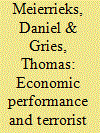| Srl | Item |
| 1 |
ID:
116232


|
|
|
|
|
| Publication |
2012.
|
| Summary/Abstract |
We investigate the link between economic performance and terrorism for 18 Latin American countries from 1970 to 2007, taking into account the potentially complex nature of this link. Panel causality analysis findings indicate that during this period, terrorism had no causal effect on economic growth. By contrast, we find that growth reduced terrorism in the less developed but not in the higher developed Latin American economies. We argue that group-specific differences (linked to patterns of economic development) govern this causal heterogeneity. From a series of negative binomial regressions we gain additional support for our findings, while also identifying further determinants of terrorism.
|
|
|
|
|
|
|
|
|
|
|
|
|
|
|
|
| 2 |
ID:
186524


|
|
|
|
|
| Summary/Abstract |
This study examines the impact of natural resource rents on terrorism via inequality channel in 34 African economies, straddling the period 1980–2012. This study employs a negative binomial regression, in which the following findings are established: first, the unconditional impact of natural resource rents on terrorism is found to be positive across the model specifications, particularly when Gini and Theil indices are controlled for. Second, inequality has no discernable first-order impact on terrorism across the board. Third, the marginal impacts of interactions between inequality measures, specifically Gini and Theil coefficients and total natural resource rents on terrorism are significantly negative. Four, the corresponding net effects of interactions between natural resource rents and inequality (Gini and Theil coefficients) on terrorism are positive, thus lending support to earlier submission of involving all constitutive variables in the specifications for the parameters to make economic sense. The results are robust to accounting for fixed and country effects using the Poisson Pseudo maximum likelihood high-dimension fixed effects estimator. On the policy front, maintaining fairness and equity in the distribution of rents from the ‘free gifts of nature’ remains a veritable policy menu, especially for the resource-rich economies, to counteracting terrorist activities.
|
|
|
|
|
|
|
|
|
|
|
|
|
|
|
|
| 3 |
ID:
162895


|
|
|
|
|
| Summary/Abstract |
The residential electricity demand in Taiwan was investigated using survey data of 7677 households between 2014 and 2017. Right-skewed regression models were employed to study key determinants affecting the household and appliance-specific electricity consumption. Appliances covered air conditioner, lighting, television, and refrigerator. The difference of electricity consumption between appliances with and without energy efficiency label was also studied; thus rebound effects were obtained. The estimated results indicate that household income, indoor floor area, and owning the house had positive influences on electricity consumption. Electricity consumption behavior was different among age groups and appliances. Moreover, rebound effect was large for air conditioner and refrigerator in Taiwan.
|
|
|
|
|
|
|
|
|
|
|
|
|
|
|
|